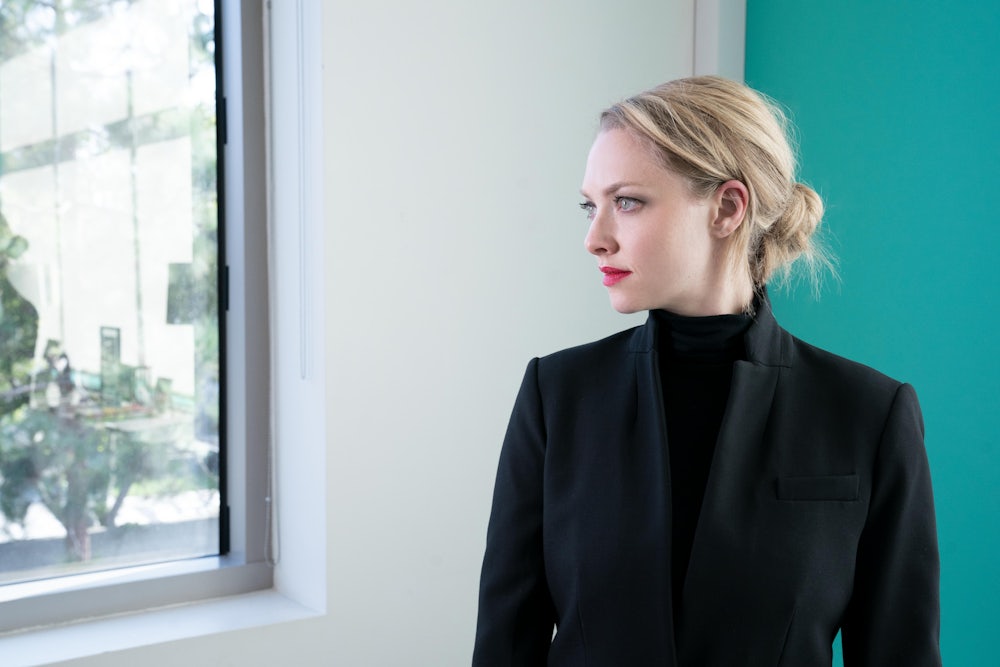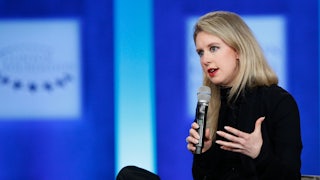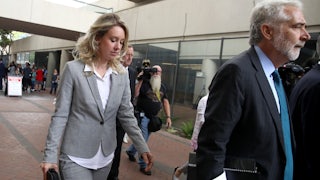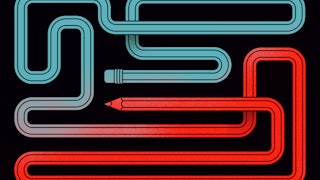Inside the soothing, edgeless white of an Apple Genius Bar in Palo Alto, two blonde-haired women widen their innocent eyes at each other across an unbridgeable gulf of understanding. One is a Genius for hire; the other, played by Amanda Seyfried, is Elizabeth Holmes, the Stanford dropout who founded the startup Theranos, claimed the company could run hundreds of medical tests using a mere finger prick of blood, received media fanfare as the youngest self-made female billionaire, and is now, many years later, awaiting sentencing for wire fraud.
In this scene from Hulu’s new miniseries The Dropout, Holmes has not yet adopted her well-known deep voice or the regulation black Issey Miyake turtleneck she’d wear in homage to Apple founder Steve Jobs. Here the two nervy women seem to be trying to give each other a pep talk. The Genius reassures her customer that the information on her existing device will only be visible for a few seconds while it’s transferred. Holmes, meanwhile, consoles her server with the insight that everything will be OK for her, in the sense that “Nothing you do will matter, because you don’t really care. You have no ambition. You don’t want to do anything important. You’re just a person.” The Genius looks a little stunned by this, but it’s only when she realizes she has messed up professionally—all Holmes’s data has been wiped—that she begins to stammer and cry: “I did everything right! I mean, I followed all the steps! I was just too quick.…”
Soon, we see Holmes confront the board of Theranos as they attempt to push her out as CEO. They tell her she needs “adult supervision”: Her futuristic blood-testing gadget is still nonfunctional, FDA approval is nowhere in sight, the promised big pharma deals are stalled, the design team has quit, and she’s hemorrhaging cash. At this point, to the visible discomfort of the roomful of older men, Holmes begins to weep. “You’re right,” she tells them. “I’m a girl who had a dream to change the world, and I just didn’t know how hard it would be.…” It takes a minute to notice that she is channeling her Genius service provider, repeating some of her lines verbatim: “I did everything right! I followed all the steps! I was just too quick.…” Then she makes the crucial pivot: She’s bringing in her own adult, “an old friend,” Sunny Balwani (Naveen Andrews), as COO, with a $20 million personal investment, and they plan to start flogging their tests straight to retail customers—like an Apple store for blood. The board, outfoxed, complies. Now she just needs to go home and convince Sunny—the older boyfriend she secretly lives with—that he should give her the $20 million and come aboard instead of breaking up.
Sequences like these are the best parts of the Hulu show—the funniest, the most absorbing and surprising. They focus mainly on the machinations of the business, played for high camp, with pop songs turned up loud on the soundtrack. Sunny dances with Holmes in their palatial apartment, wearing a promotional mask of her face. We watch her quietly menace young, patrician Theranos employee Tyler Shultz (Dylan Minnette), who has only just figured out she’s a fraud, in front of the assembled guests at a party. We see her reaction to the death of Ian Gibbons, Theranos’s head of chemistry, movingly portrayed by British stalwart Stephen Fry. Sidelined at the office and under subpoena for a lawsuit against Holmes, Gibbons takes his own life rather than testify about the patents that falsely include her name alongside his; once informed, she continues with her work, pausing only to note to Sunny, as if passing on a forgotten agenda item for a meeting, that this means “We won.”
Such moments, which cast Holmes less as a character with motivations than as a nearly impersonal force that acts on others, exposing their strengths and weaknesses, felt oddly refreshing. After centuries of culturally demonizing resourceful women who wield power, we now suffer a glut of post-feminist correctives: Even Cruella de Vil has recently been granted a redemptive backstory. Naturally, it’s not that Elizabeth Holmes isn’t a real person with an inner life, with hopes and fears and difficult experiences in her past that informed her later actions—it’s just that those may not warrant exploration over the arc of an eight-part miniseries.
Holmes herself as a subject is not all that interesting—as with Anna Delvey or any other high-profile scammer, it’s more revealing to look at the people around her, who insisted on believing in self-evidently ludicrous deceptions. More compelling still—as well as a lot more fun—is to watch the action as a kind of heist movie, detailing the mechanics of how she got away with it all for so long. Knowing how the device was developed may help you understand what’s going on inside, but what really matters is whether and how it works.
Unfortunately, The Dropout can’t quite commit to any given genre. The show is hemmed in by an array of nonfiction sources: Holmes’s story has already been told in the 2019 podcast of the same name (from which the show is adapted), in John Carreyrou’s 2018 book Bad Blood: Secrets and Lies in a Silicon Valley Startup, in Alex Gibney’s 2019 documentary The Inventor: Out for Blood in Silicon Valley, and a profusion of news reporting on Holmes’s recent trial. Each of these could facilitate a different treatment of Holmes: Is she a tragic heroine brought low by hubris? The victim and puppet of abusive mastermind Balwani? A misunderstood pioneer, sacrificed on the altar of progress? Or perhaps a lovable rogue embarking on the sort of caper the rest of us only get to dream about?
While attempting to hold a range of possible Holmeses in tension, The Dropout does indulge in some paint-by-numbers psychologizing, as if the desire and drive to be phenomenally successful were one that needed special explanation. As a little girl, Holmes ranks last in a race; her daddy loses his job at Enron (a detail one couldn’t, or perhaps wouldn’t, make up). Even her fake voice is implicitly connected to a kind of trauma, as she starts robotically practicing it in the mirror soon after Sunny, in a rage, has yelled and flung at her the green juice he prescribed to sculpt her into a leader, splattering it on her white shirt like slasher-movie blood.
There are distinct advantages, though, to this instability of tone and interpretation. It allows the audience to choose our own adventure, letting our sympathies roam around—even I caught myself making a fist when Holmes gave an investor her impassioned speech about the monopolistic corruption and price-gouging of the lab-testing industry she planned to disrupt. And it lets different characters illuminate each other’s blind spots, as when Theranos whistleblower Erika Cheung (Camryn Mi-young Kim) scolds Tyler in a stairwell for struggling to believe Elizabeth would knowingly use diluted blood in Siemens machines and pass off the results as coming from her shiny little “Edison.” As if addressing all the high-end Holmes enablers who stayed with her for years, Erika asks him: “Why do you think she doesn’t know what’s going on in her own company? Because she’s a woman? Because she’s friends with your grandfather? Because she’s rich like you and she comes over for brunch?” She could even be addressing the show’s creators, a reminder to themselves that there’s nothing feminist about assuming that Holmes, whatever her history, somehow couldn’t help herself.
Yet I did find in The Dropout a kind of misplaced feminist impulse to burnish her image, to present her in a way that’s as consistent as possible with how she chose to self-identify. The show can’t resist emphasizing Holmes’s awkwardness, her weirdness, her difficulty in understanding and emulating feelings and behaviors that appear to come naturally to others. In college, she has to practice being normal in the mirror so as not to freak anyone out during simple interactions. “I don’t feel things the way other people feel things,” she tells Sunny early in their relationship, “but I love you.” Even the twinned scenes in the Apple store and the boardroom hint that Holmes succeeds by borrowing wholesale the shtick of a normal girl, presumably alien to her. From this perspective, Holmes isn’t just, say, a privileged person raised to believe she could do anything, supported and coached and funded by powerful friends and professional bullshitters, rewarded for lying and not made to stop until it was far too late. Instead, she’s a freakish visionary.
This sort of reflexive exceptionalism makes it seem as though the show’s writers are of Holmes’s party without knowing it. They offer a portrait of the artist as an emotionally stunted nerd that—while disturbing or sympathetic, depending on your point of view—is above all familiar from other portrayals of tech entrepreneurs, most famously Aaron Sorkin’s much-mocked version of Mark Zuckerberg in The Social Network, victorious but alone, hitting the friend request button on the long-lost ex-girlfriend he’d once derided for not getting into Harvard. It’s an arty person’s imagining of a techy one—who could invent Facebook but a guy who had no idea how else to connect? To make this same move with Elizabeth Holmes feels intended as some twisted compliment, adding her to the pantheon of men she always aspired to join.
Holmes is neither a scientist nor an engineer—she didn’t actually invent anything that might need explaining—and the writers know, as we all do, that her Jobsian persona was a fiction constructed to make herself more credible to investors and journalists. Though some noticed long before her downfall that a person who dropped out of undergrad after two semesters was very unlikely to be able to pioneer a medical breakthrough, Holmes’s career models were college dropouts, and she saw the key was to quack like a duck, and wear the duck’s same designer turtleneck. It worked, for years, and—even after the collapse of Theranos—there’s a very real sense in which, on-screen and off, it’s still working.






